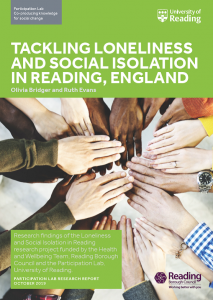In our latest Think-Piece, Ruth Evans, Participation Lab Leader, discusses how loneliness and social isolation can best be prevented and tackled in Reading. The Participation Lab report, published today, is based on her research with Olivia Bridger, recent Geography graduate, for a Undergraduate Research Opportunities Programme (UROP) project commissioned by the Health and Wellbeing Team, Reading Borough Council.
Our research demonstrates the closely entwined relationship between isolation and loneliness, and how these are linked to health and wellbeing. Loneliness represents both a cause and consequence of emotional, mental and physical ill health. By focusing on societal, situational and personal risk factors and barriers that prevent people from developing good social connections and networks, the research demonstrates the complex, multi-faceted nature of loneliness and social isolation.
Tackling loneliness has become a key priority for local and central government in England in recent years, with the Government’s Strategy for Tackling Loneliness published in October 2018, following the appointment of a Minister for Loneliness. The policy focus on loneliness was largely spearheaded by the work of the late Jo Cox, Member of Parliament, and the Commission for Loneliness established after her death that sought to continue the work she started. As the Government Strategy document recognises, loneliness is not new, but there is an increasing body of evidence pointing to the negative effects of loneliness on people’s social wellbeing, in addition to their physical and mental health.
Local authorities and third sector organisations are rapidly responding to this new policy focus; Reading Borough Council identified ‘Reducing loneliness and social isolation’ as one of its eight priorities for Health and Wellbeing for 2017-2020 and a Multi-Agency Steering Group on Loneliness and Social Isolation in Reading was established in 2017.
Our research in Reading shows how societal factors, such as cuts in public services, stigmatization of particular groups or barriers to statutory service provision, for example, may further marginalise people who are already vulnerable to loneliness due to their particular situation or circumstances, such as experiencing mental illness, disability, ageing and loss of mobility, caring responsibilities, living alone, bereavement or other troubling changes and disruptions across the lifecourse.
It has been widely recognised that there is no ‘one-size-fits-all’ approach to tackling loneliness and social isolation. Our research with practitioners and service users, volunteers and community members who may be vulnerable to loneliness identified a number of best practices in alleviating and preventing loneliness and social isolation in Reading. These include:
- Specialist support and safe spaces
- Focused group activities
- Making services and activities socially, financially and physically accessible
- Advocacy and assistance ‘taking first steps’
- Peer support, befriending and volunteering
- Signposting to ‘someone to talk to’
- Support from healthcare professionals
- Raising awareness about loneliness, isolation, social anxiety and mental health
- Befriending, good neighbourliness and faith communities.
A key mechanism for successful loneliness interventions identified by Victor and others (2018) is in ‘reconnecting’ those who are experiencing loneliness within their community via the development of meaningful relationships. Central to such interventions is the need to tailor services to vulnerable groups, in terms of sociodemographic, spatial or loneliness experience characteristics. There was also a need for recognition that loneliness interventions could potentially stigmatise users, if not advocated sensitively.
Service providers in Reading appeared to be aware of these issues and did not label or regard their work only as ‘loneliness interventions’, but rather felt that existing services they provided to marginalized groups aimed to facilitate good social encounters and could lead to the development of meaningful relationships among service users, with staff, peer support volunteers, befriending volunteers or community members.

Our research suggests that support needs to be specifically targeted to meet the diverse needs of the people most at risk of loneliness and social isolation according to socio-economic, geographical, gender, age and ethnicity differentials, in addition to situational and personal factors. These include immigration status, homelessness, drug and alcohol addiction, mental health, disability, loss of mobility and long term illness, caring responsibilities, living alone, lifecourse transitions and so on. There was also a need identified for services, support and activities to be socially, financially and physically accessible and to address barriers in accessing statutory service provision, including the stigmatisation of some groups.
We identified key recommendations to strengthen and develop best practices for reducing loneliness and social isolation in Reading:
- Raising awareness about loneliness and social isolation and its links to health and wellbeing among statutory and voluntary and community sector service providers, employers, schools, members of the public
- Greater provision of specialist support services for groups at risk of loneliness and social isolation, encompassing tailored one-to-one support, as well as group activities, with increased opening hours, particularly at weekends
- Fostering more collaborative working ‘joined-up’ thinking and signposting between organisations, Reading Borough Council and primary healthcare providers
- Increasing the affordability and social accessibility of transport, including through concessionary fares, building people’s confidence, supporting and raising awareness about alternative transport services for people with complex needs and carers, such as ReadiBus and neighbourhood volunteer transport initiatives
- Developing and supporting peer support initiatives and befriending and volunteering schemes
- Fostering good neighbourliness, supportive faith communities and community development
- Providing more accessible information, communication and promotion of activities and services in appropriate formats.
We are pleased to launch the report and discuss with practitioners how the recommendations can be taken forward as part of the Action Plan of the Reading Loneliness and Social Isolation Multi-Agency Steering Group at a meeting held at Reading Borough Council on 17th October 2019.
The Report and Executive Summary are available to download here.

We welcome any feedback.
Dr. Ruth Evans, Participation Lab Leader & Associate Professor in Human Geography, University of Reading.
Email: r.evans@reading.ac.uk; Twitter: @DrRuth_Evans; @participlab

